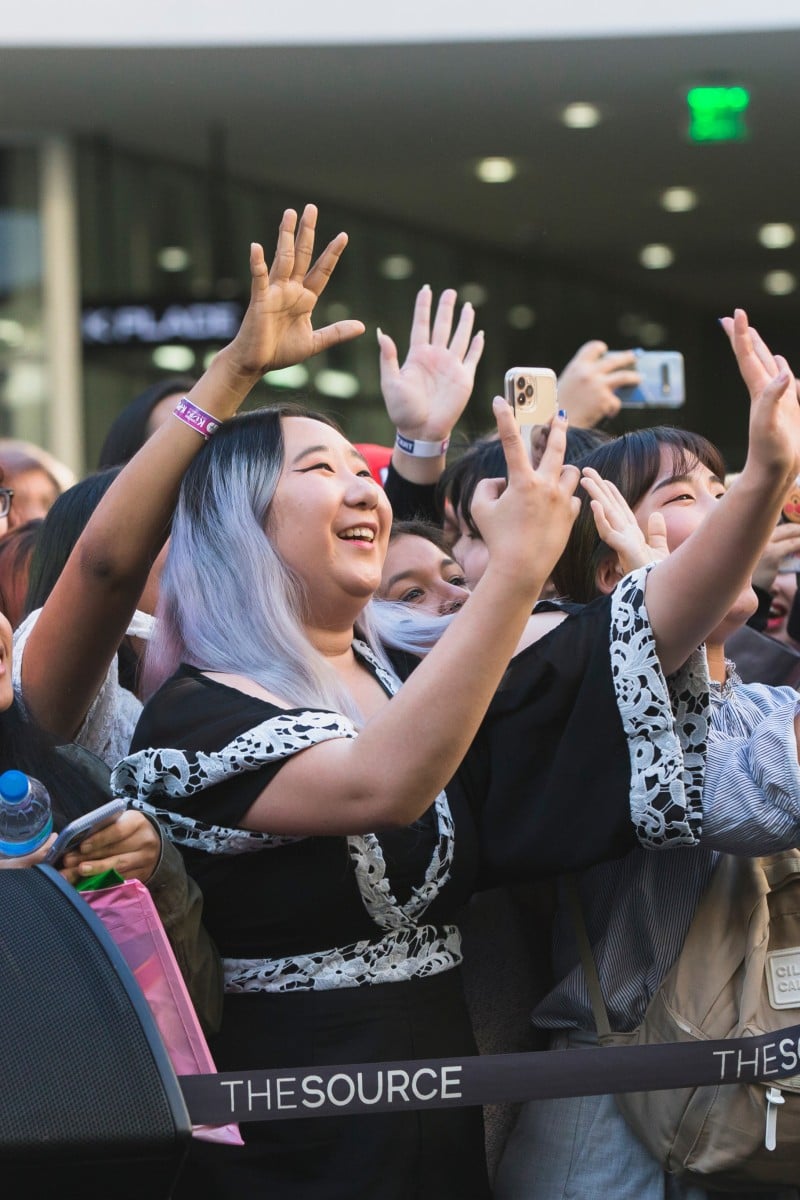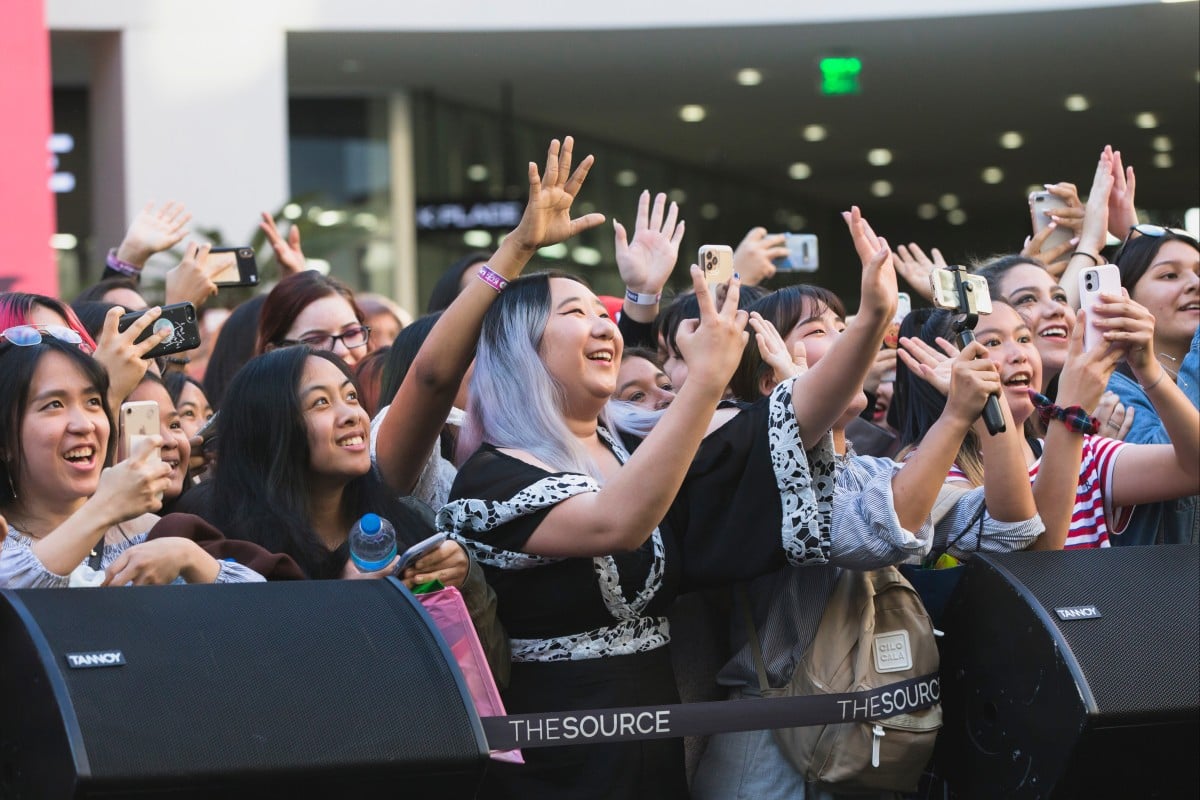
- Each week, two of our readers debate a hot topic in a showdown that does not necessarily reflect their personal viewpoints
- This week, they discuss the merits, and downsides, of pop culture super fans
 K-pop fans gather to participate in a group activity in the US state of California in 2019. Photo: Shutterstock
K-pop fans gather to participate in a group activity in the US state of California in 2019. Photo: ShutterstockIf you are interested in joining future Face Off debates, fill out this form to submit your application.
For: Chan Bo Wen, 14, HKCCCU Logos Academy
In general, the idea of a group of starry-eyed enthusiasts banding together to form a club due to their common interests is harmless. However, it becomes an issue when fans begin exhibiting harmful or aggressive behaviours towards people who do not share their opinions or become too obsessed with the object of their affection.
Fandom culture in our city is undeniably invasive. I’m sure we’ve all noticed the plethora of billboards and advertisements showcasing idols or music groups: take Keung To’s birthday on April 30, for instance. During the weeks leading up to this date, his face was plastered across Hong Kong, from MTR advertisement spaces to Keung To trams travelling across Hong Kong Island, thanks to a partnership between the tram company and his fan club.
All about Cantopop boy band Mirror and how they compare with BTS
On the actual date, thousands of fans flocked to Causeway Bay (nicknamed “Keung To Bay” due to the staggering amount of billboards filled with birthday proclamations) to take selfies with the billboards and, hopefully, with him. For someone like To, who is young and reportedly very shy, this situation has to be overwhelming, especially in a small city like Hong Kong, where he can be recognised wherever he goes.
Secondly, fandom culture bears an overly consumerist mindset. The belief that a “true” supporter should spend all their money on merchandise and concert tickets is undoubtedly harmful and regrettably common. One study conducted by iPrice, Southeast Asia’s leading e-commerce aggregator, discovered that fans of BTS spend an average of US$1,422 (more than HK$11,000) on products such as albums, photocards and concert tickets.
Meanwhile, Twice’s fans spend about US$824 (about HK$6,450), and Blackpink’s spend US$665 (roughly HK$5,205). Many fandoms actively pressure enthusiasts to spend money in support of their idols. This is especially toxic to fans in poor financial situations or underage fans who are already exposed to over-consumerism.
In conclusion, fandom culture in Hong Kong is unquestionably toxic due to its intrusiveness and materialism. However, I’m sure fans would create a more positive environment with a little bit of work.
Against: Grace Lam, 14, Diocesan Girls’ School
Some might say that fandom culture is immature and inappropriate, but every aspect of life has good and bad sides.
Fandoms provide youngsters with a safe environment, typically online, to discuss their interests without prejudice.
According to research by the Organisation for Economic Co-operation and Development, online communities can foster a sense of belonging, which is especially beneficial for people suffering from depression. Having a platform where teens express their ideas and opinions without feeling insecure and judged can allow them to be their true selves.
Pink hair unites women in fight against cyberbullying in China
Hong Kong’s Covid-19 restrictions and school closures were tough for everyone, especially students. They were unable to see their friends or participate in their usual after-school activities. Music, TV shows and movies were a lifeline during this time, and chatting about their favourite pop culture phenomenon gave teens an easy way to bond with others during this isolating period, as well as something to focus on besides the virus.
Offline, fandoms can help people connect and do good. A good example is Cantopop group Mirror, which became famous during the Covid-19 pandemic. Mirror is often credited with reviving an interest in the genre, which had been declining since the 1990s, and for giving Hongkongers something truly Hong Kong to love and bond over during a distressing time.
Mirror fans have arranged free tram rides, pop-up fundraiser shops and even a charity walk to celebrate member Keung To’s birthday and have even donated hay in his name to feed the city’s wild cattle. For Anson Lo’s birthday, they sponsored free rides on the Star Ferry and organised charity events worldwide, including a food drive in Singapore and a shoreline clean-up in Canada. They are driven to do good in the name of their idols, which is certainly a positive outcome of fandom.
Some say that Hong Kong’s fandom culture is toxic and makes people stop caring about the outside world. Others insist that fandoms encompass a range of harmful and abusive behaviours.
However, Hong Kong’s fan culture encourages adults and children to connect through community. It allows them to bond and do good things in the name of their idols.
